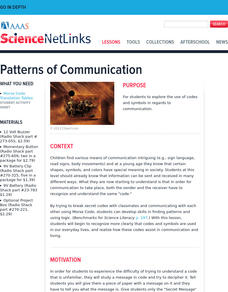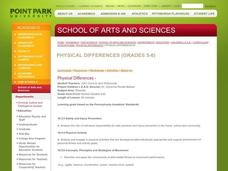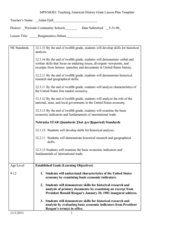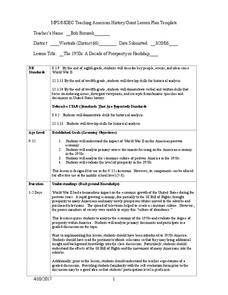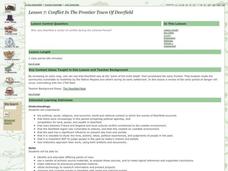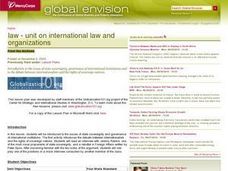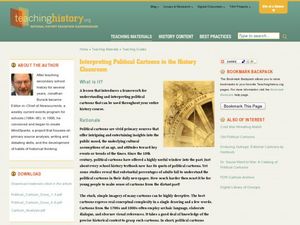Curated OER
The Feudal System: Castles At War
Students create a first person account of life in the middle ages from the perspective of a king, noble, knight or peasant. They view and discuss a Discovery Channel video then research the roles and responsibilities of their class...
Curated OER
Sorting
Young scholars understand that sorting helps find things at a later date. In this sorting lesson, students use a website game and sort the common items. Young scholars sort folders and other classroom items. Students discuss how sorting...
Curated OER
Diversity
Students access prior knowledge of the five senses and relate to students with disabilities. In this people with disabilities lesson, students research and use a Venn diagram to compare and contrast famous people and their...
Curated OER
Reaganomics Debate
Students examine the effectiveness of 'trickle down' economics. In this "Reaganomics" instructional activity, students use readings, analogies, discussion and debate to understand basic economic concepts. Students will analyze the what...
Curated OER
American Economics after WWII
Students analyze the American culture after WWII. Through a variety of activities, students gain an understanding of ecomonics and prosperity in the US following WWII.
Curated OER
Burning Issues
Students study fire management. In this science lesson, students recognize and understand what they think would be the most responsible and appropriate actions to take in regards to fire managment.
Curated OER
Lift Every Voice and Sing
Students analyze sculpture, poetry, and music to gain an understanding of historical events. In this critical thinking skills lesson, students take a closer look at African-American history as they examine "Lift Every Voice and Sing'"...
Curated OER
How many edges do I need to cut in order to open a cube?
Students problem solve to open a cube to create different shapes. In this problem solving lesson plan, students are given a cube and the shapes to open it up to, and they have to cut the cube open to make certain shapes. This gives them...
Curated OER
Conflict in the Frontier town of Deerfield
Students use primary sources to investigate, explore and represent varying perspectives on the 1704 Deerfield Raid. They consider the reasons Deerfield was at the center of English, French and Native American conflicts in the early 18th...
Curated OER
Blame It On El Nino
Students understand what the weather phenomenon El Nino is and what causes it. Students recognize how remote sensing technology can detect and predict El Nino. Students discover how El Nino effects weather conditions throughout the globe...
Curated OER
International Law and Organizations
Young scholars conduct research and debate some of the conflicting viewpoints surrounding state sovereignty vs. the governance of international institutions. They read interviews and participate in role-plays.
Curated OER
Finding Science in An American Childhood by Annie Dillard
High schoolers read excerpts from Annie Dillard's memoir, "An American Childhood," with the teacher. They experience opportunities to connect English, science, nature and art together from a new and unique perspective. This approach...
Curated OER
Reading Comprehension: Context Clues
Fifth graders use context clues to help them understand unknown words. In this context clues lesson, 5th graders practice identifying context clues on a worksheet, then work with a peer to write their own story. Stories are peer edited...
Curated OER
Differing Expectations
Young scholars examine the expectations that colonists had for lives prior to the revolution. In this colonial America lesson, students read primary documents that feature the perceptions of white men and minorities during the time...
Curated OER
Polydron Fun
Young scholars investigate nets as they relate to volume and area. For this geometry lesson, students use nets as a visual to deepen their understanding of surface area and volume of objects. They make conjectures about different objects...
Curated OER
Migrant Workers Through the Lens of Dorothea Lange
Students explore the lives of migrant workers during the Great Depression. For this Great Depression lesson, students examine photographs and song lyrics to gain an understanding of the conditions for people living in the era. Students...
Curated OER
Utah's Harvest
Fourth graders recognize the importance of the physical geography on a community. In this commodities lesson, 4th graders graph the five most important commodities of Utah. Students understand why these commodities are so...
Curated OER
Why Is My Bread Fuzzy?
Students explore the organisms that live on counters or surfaces in the classroom. In this mold experiment, students observe mold in different conditons. Students record their observations on a worksheet. Students understand how...
Curated OER
Interpreting Political Cartoons in the History Classroom
Students analyze political cartoons. In this historical perspectives lesson, students use the provided cartoon analysis worksheet to examine the political cartoons that their instructor shares with them.
Curated OER
Lesson Plans on the Intersection of History and Literature
Finding out about "the story behind the story" can provide a greater understanding of literature and its historical and social context.
Curated OER
History and Culture of Turkey
An exploration of the history and culture of Turkey can provide students with a greater understanding and appreciation of this region.
Curated OER
Genocide-Holocaust
Twelfth graders gain insight and perspective as to how and why the Holocaust occured. They explain why the specific groups were targeted, and complete a brief paragraph about what it would have been like to live during this era.
Curated OER
Westmoreland Trail
Seventh graders complete a unit of lessons on the Westward expansion of the U.S. They play the computer game, Oregon Trail III, read primary source documents, conduct Internet research, write diary entries from the pioneer viewpoint, and...
Curated OER
Rape: Psychology, Prevention and Impact
Learners are introduced to the characteristics of rape. As a class, they identify statements as either facts or myths about rape. In groups, they complete a survey to identify their own perceptions about rape and compare them with...

